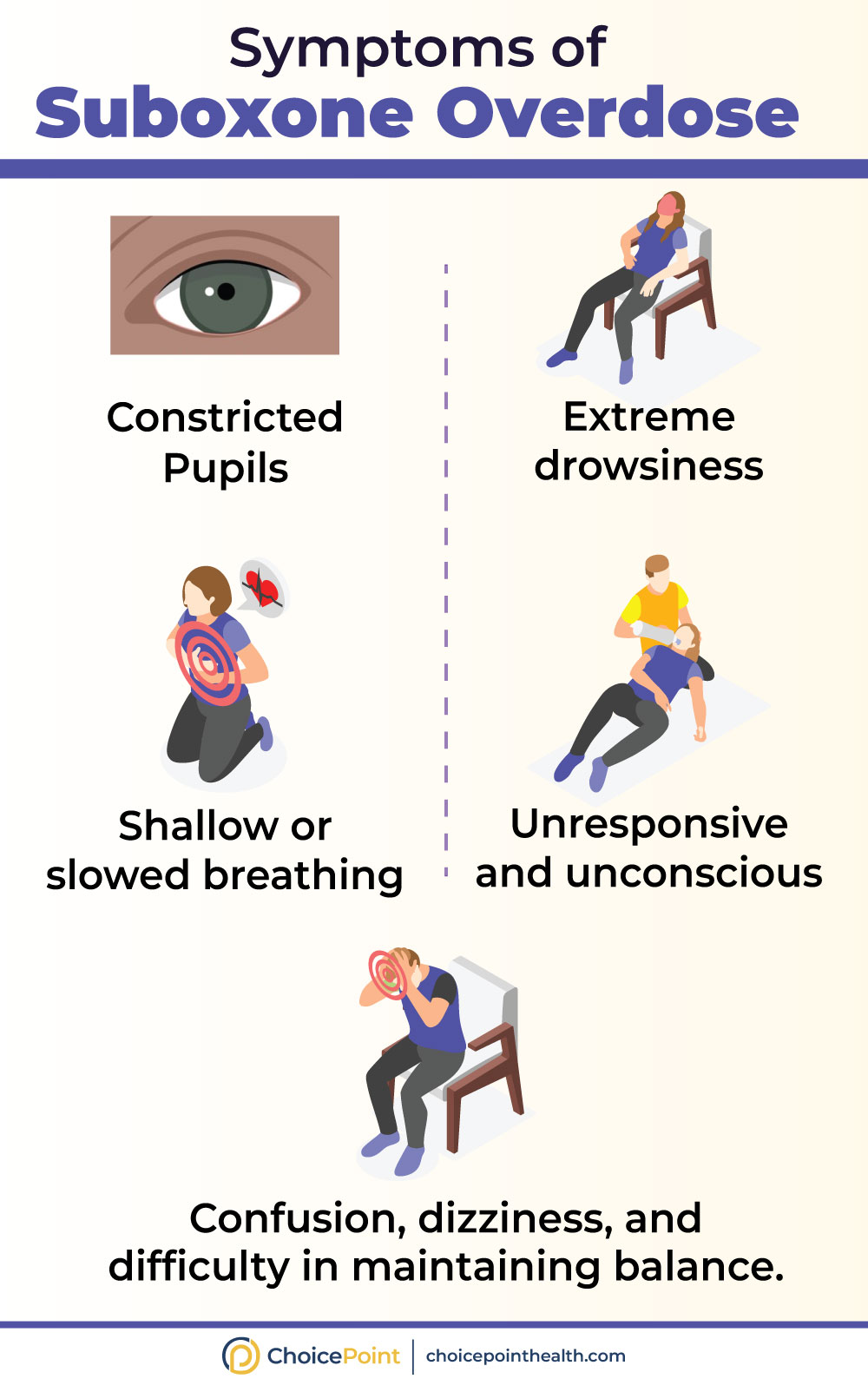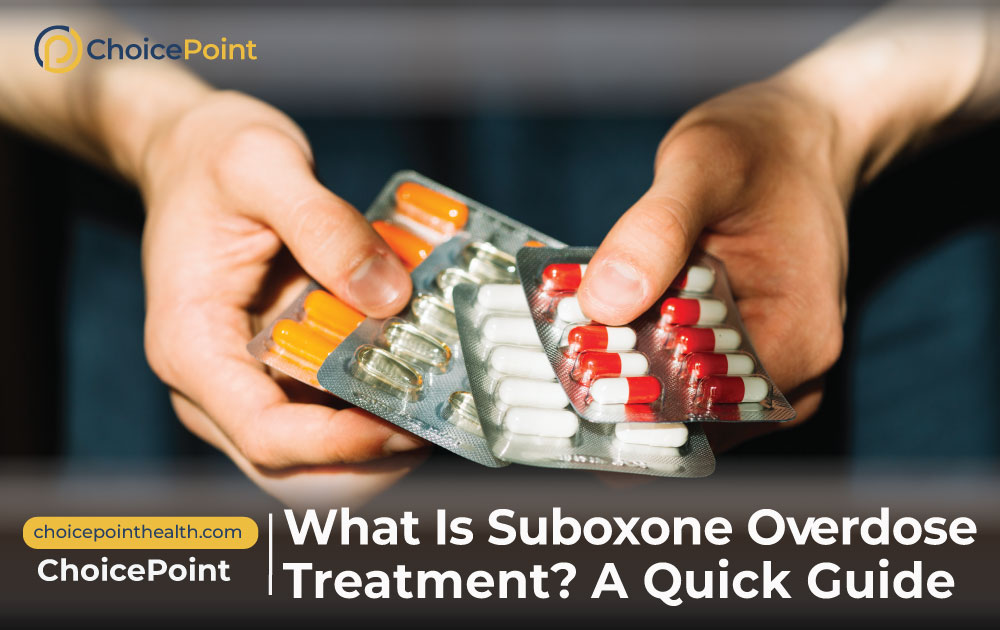Suboxone is mainly prescribed as Opioid replacement therapy during Medicated-Assisted Treatment (MAT). Suboxone ingestion may be a life-threatening emergency requiring prompt medical intervention from trained professionals. This blog will explore the treatment for Suboxone overdose and how ChoicePoint can help you!
ChoicePoint is a co-occurring addiction treatment rehab where DEA-certified addiction practitioners prescribe FDA-approved medications after careful evaluation. To consult with our doctors, call 844.445.2563.
Table of Contents
How Much Suboxone Can Cause an Overdose?
A Suboxone overdose has been recorded in opioid-naive patients (not chronically receiving opioids daily), with even a 2 mg sublingual dose as the lowest available amount. The following factors may influence the likelihood of a Suboxone overdose:
- Route of administration
- Use of other sedatives
- Individual’s tolerance of opioids
- Underlying health
What Is The Treatment For Suboxone Overdose?
Did you know that some typical indications of a Suboxone overdose may include a moist, sweaty complexion, a weak and unresponsive physique, and a reduced respiration rate? To help an individual going through a suboxone overdose is by providing them with urgent care. Suboxone is a combination of Naltrexone/Buprenorphine. Buprenorphine binds to opioid receptors significantly more strongly than naltrexone and naloxone. As a result, Narcan (or any naloxone or naltrexone medication) is far less successful in reversing overdose for Suboxone than for any other opioid, necessitating extremely high doses of these anti-overdose drugs.
Remember, in case of overdosing on Suboxone, an individual is not advised to delay reaching out for urgent help from a healthcare provider. If you want to save a life and recover from a Suboxone over, call ChoicePoint now at 844.445.2563!
Here is how a Suboxone overdose can be treated:
a. Call an Alcohol and Drug Hotline
The first thing to do when dealing with a Suboxone overdose is to call a substance abuse hotline. The trained staff on the other end may guide about what to do to reduce the severity of the overdose. When an individual arrives at a medical facility, healthcare professionals prioritize the following:
- stabilizing vital signs
- maintaining an open airway
- delivering supplemental oxygen
- maintain hydration
- restore electrolyte balance
- intravenous fluids
- monitor heart rate, blood pressure, and respiration

Signs You May Be Taking Too Much Suboxone
b. Naloxone Administration
In a Suboxone overdose, healthcare providers may provide Naloxone (an opioid receptor antagonist). Naloxone works by displacing opioids from receptor sites and restoring the respiratory depression produced by suboxone ingestion. It should be noted here that Suboxone contains buprenorphine, which has a longer duration of effect than other opioids. As a result, naloxone’s effects on Suboxone overdose may be restricted.
c. Psychotherapies
Apart from using FDA-approved medication, it is critical for long-term recovery to address the underlying causes of addiction and provide psychological support. Suboxone overdose victims may benefit from counseling and addiction treatment programs. These interventions may assist in addressing the underlying causes of addiction, developing coping skills, and lowering the risk of future overdoses.
ChoicePoint offers CBT and DBT to help individuals suffering from addiction cope with cravings and adjust to a sober lifestyle. To schedule an appointment with us, call 844.445.2563.
d. Detoxification and MAT
The following is a brief overlook at what happens during the detoxification stage:
- Detoxification is essential for eliminating toxins from the body, a crucial step in addiction recovery.
- Replacement drugs, like Suboxone, are used in opioid use disorder to support recovery and detox.
- The detox duration varies based on the severity of Suboxone abuse, with more intense abuse requiring longer detox periods.
- Patients may detox in the hospital or through an intense outpatient detox program.
The best course of action for treatment is determined by evaluating individual circumstances, medical history, and rehab requirements, ensuring a customized and effective recovery plan.
It is advised not abruptly to stop Suboxone to avoid severe withdrawal symptoms. Rather, let trained healthcare providers of Choicepoint assist you under their constant care and supervision. To consult with our addiction specialists, call 844.445.2563 today!
Treatment For Suboxone Overdose At ChoicePoint
ChoicePoint is a co-occurring addiction rehab where we accept all state-funded and private insurance to make recovery easier for you. Our doctors carefully evaluate each patient and provide customized addiction treatment programs. Treatment for Suboxone overdose must be performed promptly to protect patients’ mental and physical well-being. Addiction Treatment Programs for a Suboxone overdose at ChoicePoint may include:
Furthermore, prevention is crucial in minimizing the risk of Suboxone overdose. A Suboxone overdose may be avoided with regular monitoring throughout medication-assisted treatment and careful adherence to dosage guidelines. To navigate the path to recovery and reduce the danger of future overdoses, addiction specialists and a strong support network are essential.
If you or a close one displays signs of a Suboxone overdose, do not hesitate to get urgent medical treatment. To seek early intervention so you can save lives, call our DEA-certified practitioners at ChoicePoint now at 844.445.2563. You can schedule in-person and Telehealth appointments.
Most Concerning Questions Regarding Suboxone Overdose
Learn about the frequently asked questions;
How do you reverse buprenorphine overdose?
To reverse the buprenorphine overdose caused by low-dose buprenorphine, a doctor should administer the patient with a continuous infusion of naloxone at 2-4 mg/70 kg/hour doses.
Is there a way to reverse Suboxone?
Yes! Immediate medical intervention can save someone from a Suboxone overdose. Naloxone administration may momentarily stop an overdose. However, it will eventually wear off because it has a much shorter half-life than buprenorphine. After naloxone wears off, the person could continue to experience the effects of an overdose.
What is the best treatment for Suboxone overdose?
Immediately call 911 or contact a substance abuse hotline. Start CPR (best done by someone with training) if the person has stopped breathing or if breathing is very weak. If naloxone is available, use it to treat an opioid overdose.
Medical Disclaimer:
ChoicePoint aims to improve the quality of life for people struggling with substance use disorder and mental health issues. Our team of licensed medical professionals research, edit and review the content before publishing. However, this information is not intended to be a substitute for professional medical advice, diagnosis, or treatment. For medical advice please consult your physicians or ChoicePoint's qualified staff.











Review What Is Suboxone Overdose Treatment? A Quick Guide.